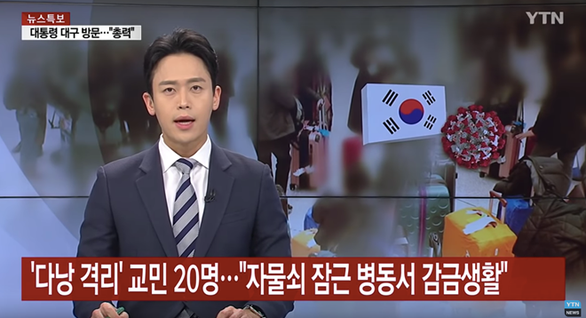Editor's note: Dr. Se Gun Song is a South Korean who teaches social work at Thang Long University in Hanoi.
He wrote the following piece for Tuoi Tre News after learning about what he calls "rising anti-Korean sentiment" in Vietnam following a recent report on South Korean cable news channel YTN, which painted in a bad light Vietnam's treatment of South Korean nationals placed under quarantine in the Southeast Asian country.
The following article has been edited by Tuoi Tre News for clarity, consistency, and coherence.
A South Korean news channel has issued a statement regarding a recent report on the treatment of its nationals placed under quarantine in Vietnam, as the Southeast Asian country struggles to maintain its grip on the novel coronavirus disease (COVID-19).
A couple of days ago, I received a text message from a Vietnamese colleague advising me not to "go around telling you are a Korean in Hanoi now." I thought she must have heard some rumors. I was grateful for her advice but could not help thinking that she was overreacting somewhat.
Today I saw the headline "rising anti-Korean sentiment in Vietnam" on the Korean news on the Internet. The news reported on the ‘#ApologizeToVietnam’ campaign in detail, which is drawing a great deal of public attention at the moment.
Here is what I have to say on the issue as a Korean living in Hanoi who loves Vietnam and Vietnamese people. In Korea, media outlets can raise diverse voices. In recent years, along with the growing popularity of Internet news, the focus of journalism has increasingly become to garner as many readers’ clicks as possible. This leads to sensationalism, and real truths are often compromised and distorted in the process.
South Korea has an upcoming national election in April, so this is a very sensitive period in Korean politics. The majority of Koreans are very upset about the wide spread of the coronavirus and the government’s response, and many are even jealous of the Vietnamese government’s prompt response.
News coverage in the Korean media, which reported on the treatment of Koreans in Da Nang that triggered the anti-Korean sentiment subsequently, was specifically intended to highlight the negative impact of the South Korean government’s failure to effectively deal with the coronavirus.
The reporter wanted to portray how Koreans suffer because the government has failed to successfully quarantine people. It has virtually nothing to do with Vietnamese people’s treatment of Koreans.
|
|
| Dr. Se Gun Song, a social work lecturer at Thang Long University in Hanoi, Vietnam, is seen in this provided photo. |
I would like to ask ‘#ApologizeToVietnam’ campaigners who should apologize, since an apology would represent no more than a single reporter or a media company who has a hidden agenda. The news is by no means representative of how the majority of Koreans feel. Despite the attempt to sensationalize the issue, and although it is true that there are some people who show their emotions, if you look at Koreans’ comments, the majority support and even praise the Vietnamese government’s proactive approaches in dealing with the virus.
Koreans are generally fond of Vietnamese people, and recent news articles regarding Vietnam are popular. The journalist who covered the story in a negative light simply wanted to take advantage of heightened interest in the relationship between the two countries. This, together with one lady’s comment on banh mi, should not be interpreted as the true voice of South Koreans on this matter.
I am pretty sure that if the journalist had further asked the woman how the banh mi tasted, she would have reluctantly responded, "it tasted unexpectedly good," which, of course, would have been revealed in the article. It is unfortunate that such an event has been picked up and escalated by some young people in Vietnam, and that it has grown into a whole campaign.
These days, South Koreans are conscious of how they are seen by the rest of the world. The turbulent modern history of South Korea includes the country dealing with four of the most powerful countries in the world: the U.S., Russia, China, and Japan.
South Koreans want to confirm their country’s heightened status in the international arena. The recent winning of the Best Picture Oscar by a Korean film, Parasite, has boosted the Korean sense of raising its ‘national class,’ yet this confidence has plummeted since the massive coronavirus outbreak in Korea.
Over the years Vietnam and Korea have built something extraordinary. Many people from both countries have worked hard to reach where they are at now. We are in great need of each other, too. It is very important for Korea, which is experiencing the rapid aging of its population, to rely on young and highly educated Vietnamese people. For Vietnam, whose economy heavily depends on foreign trade, South Korea is an important business partner.
My favorite way to describe Vietnam is as a mother-in-law country. Since Korea has an increasing number of Vietnamese women marrying Koreans, we call Vietnam family! We can find real friendship in times of trouble. If this small incident really affects the relationship built so far, then the relationship is no more than the hype built around the Park Hang Seo syndrome.
This silly episode of miscommunication needs to be stopped now. If any Vietnamese people feel hurt at the course of events that has unfolded in the last two weeks, I do not hesitate in the slightest to offer my sincere apology to them, my Vietnamese friends.




















































